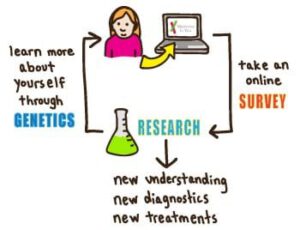
Database Snapshot:
100,611 users genotyped
76% have agreed to participate in research
59% take surveys
57% are male
47% are sharing with other users
12% have multiple ancestries
45 is the average age
100,409 posts in our community forums
60,000 pairs of relatives among users (4th cousin or closer)
More than 100,000 people have turned to 23andMe to explore their DNA for insights into their health and ancestry.
More than a Number
Linked by a shared curiosity about themselves and a willingness to participate in research, these individuals have created a powerful tool for making discoveries that could help many others. 23andMe’s unique combination of DNA technology, web-accessible tools, and content, and social networking has empowered users, who, in turn, have helped us create a new paradigm for research.
So far, more than three-fourths of 23andMe’s users have allowed our scientists to incorporate their genetic data, as well as their responses to online questionnaires, into our research. Nearly 60,000 of our users take online surveys and those who take surveys filled out at least 10 on average. They’ve contributed millions of responses to thousands of survey questions. Hundreds of users have also taken the step of submitting research topics of their own for 23andMe to investigate.
Clearly, people want a voice in reshaping healthcare and they want to accelerate scientific discovery.
23andMe Research
Through the flow of survey responses and the continued growth of our database, we’ve broken new ground. Our team of 20 scientists –including statistical geneticists, survey specialists, bioinformaticists and a medical doctor – run more than 1,000 genome-wide association studies for hundreds of conditions on a regular basis.

In just about three years, we’ve discovered new genetic associations for common traits, found novel genetic links for childhood and adult infections, replicated more than 150 previously identified genetic associations for dozens of common diseases and medical conditions, and discovered several new genetic variants associated with Parkinson’s disease.
Our Parkinson’s Research Community represents one of the largest Parkinson’s studies in the world. It’s a model we’ve used for our Sarcoma Research Community, which is now one of the largest group of patients with this rare disease. And we’re applying our research model in many other areas, including a recently-launched NIH-funded study into how genetics affects individual response to common medications.
As more people join 23andMe, our collective understanding of human genetics grows. We are focusing on research where it is needed most. We are accelerating the pace at which our discoveries come back to those who contribute to it. We believe that a world in which individuals understand more about themselves is good. And we know that 100,000 is only the beginning.



